Over 30 years of anarchist writing from Ireland listed under hundreds of topics
The Left
Eviction of Disco Disco occupation - video from 2003
Interesting bit of Dublin squatting history just went online, a video of the the 2003 attempt to squat the Disco Disco building at 41 Parnell square (West). The building had been vacant for well over a decade at that stage (and may still be?) but shortly after the squatters started securing the building a gang of heavies arrived down (10.55 in the video) and attacked them. The cops arrived and pushed their way into the building after the door had been partly opened to allow someone injured in the attack to seek medical attention.
Absolute boy - The Youth Revolt that led Corbyn to a victory of sorts
Corbyn’s strong showing in the June 2017 UK elections has given a big morale boost to the left. A considerable youth vote, self-mobilising in larger part as a reaction to the ‘me and mine’ selfish society revealed by the Brexit vote seriously set back Tory plans for a fresh wave of Brexit required austerity. Activists used social networking to overcome what had previously been seen as an all powerful smear machine of the billionaire print press. Very few outside the radical left expected this outcome, what drove it and more importantly where can it lead?
[ This is a long read so you can also listen to an audio of the text ]
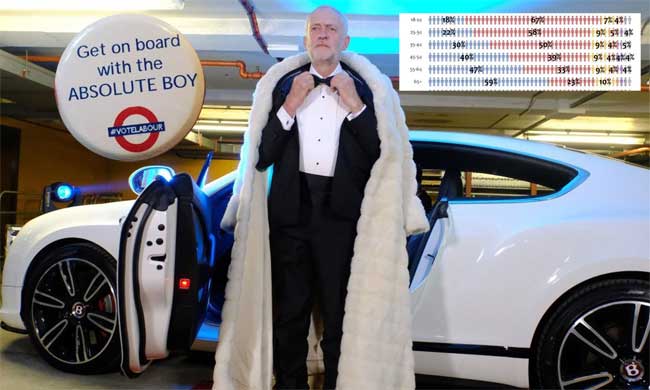
This piece is not going to answer that in terms of assumptions and assertions but as far as possible through hard numbers. 66% of 18-24 year old’s voted Labour, only a quarter of that, 18% voted Tory [p4]. 27% of those 18-24 year olds said the NHS was the most important issue for them, even though they are least likely to need it [p40]. For the over 65 age group this was flipped, only 23% voted Labour and over twice as many (58%) voted Tory [p4]. In fact, given the way the UK election system works, if only 18-24 year olds had voted, Labour would have been heading for 500 seats. If it had only been those over 65 voting the Tories would have had over 400 seats.
An Anarchist Response to “Anarchists, It Is Our Duty To Vote In Elections”
As the title suggests, this article has been written in response to this article which was written over two years ago just before the last UK General Election and as Hillary Clinton was beginning her campaign for US presidency. Coming from my own knowledge and beliefs on voting I was surprised when reading fellow anarchist Paddy Vipond’s article that he omitted major anarchist arguments against voting. In addition to serving as a response to Vipond’s piece I will discuss what he left out under his headings and address some issues that have become apparent during this current election campaign particularly with the hope that Corbyn’s Labour has sparked among the UK electorate and indeed further than that among the international electoralist left.
Elections: Shouldn't We 'Fight on All Fronts'?
 Some crticise this position, stating something along the lines of:
Some crticise this position, stating something along the lines of:
'But what about social housing, free education, and an increased minimum wage? That's change which will make a big difference to people's lives. And electoralism and grassroots organising aren't mutually exclusive. We shouldn't concede that ground to the right, we should fight on all fronts'.
Social housing, free education, increased minimum wage - there are worthwhile reforms which might be achieved by a left wing government, or might not, but they're fairly beside the point. It's worth remarking though that the best way even to achieve reforms through the state is by having strong social movements which can apply pressure to politicians.
Anarchists, Is It Really Our Duty To Vote?
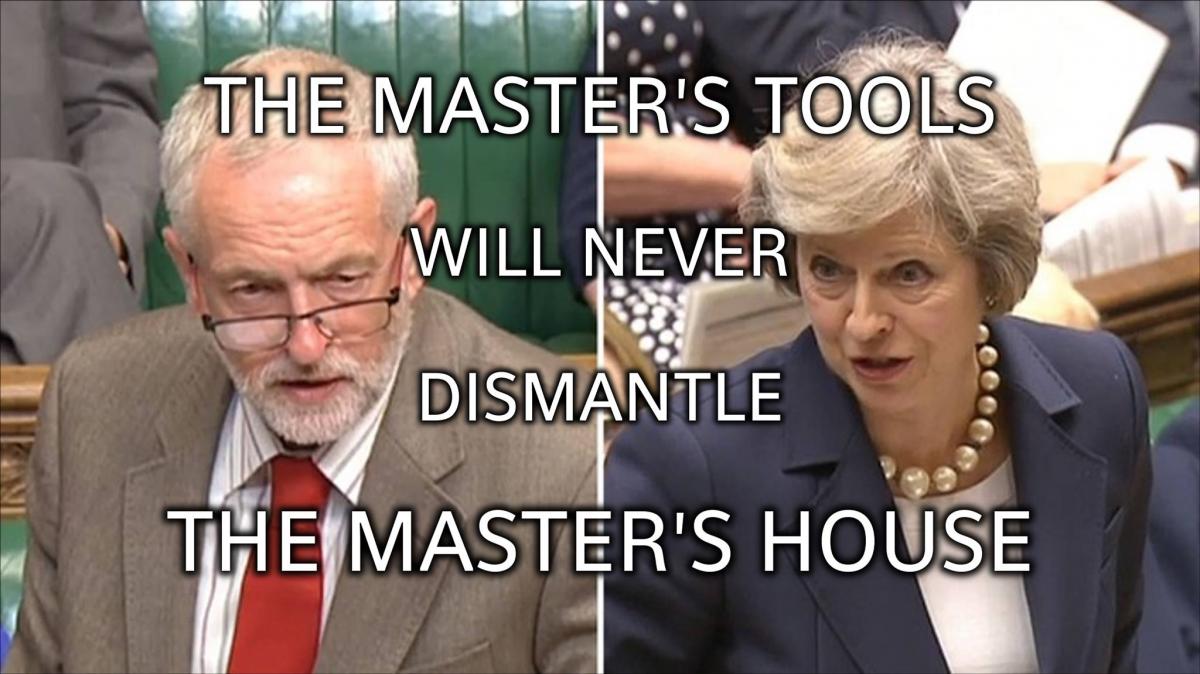 Voting has just ended in the UK election. Many people are consumed with hope that Corbyn could win and implement his reforms “for the many, not the few”. For those of us who work with the broad left, it is inevitable that the topic of elections and voting will come up. Heated debates can occur between those of us who would rather ignore the electoral circus and those who strongly believe in using it as a vehicle on the road to a new society.
Voting has just ended in the UK election. Many people are consumed with hope that Corbyn could win and implement his reforms “for the many, not the few”. For those of us who work with the broad left, it is inevitable that the topic of elections and voting will come up. Heated debates can occur between those of us who would rather ignore the electoral circus and those who strongly believe in using it as a vehicle on the road to a new society.
Before beginning, it is important to clarify the misconception that anarchists are against voting. We have absolutely no problem with voting - how else could we make decisions? We are against a system that allows for us to tick a box every four or five years which gives whoever received the most X’s to make decisions that affect our lives in a fancy building miles away from us. Politicians once elected do what they like because we can neither mandate nor recall them.
Cop on comrades - over 250 women respond to left attack on 'Identity Politics'
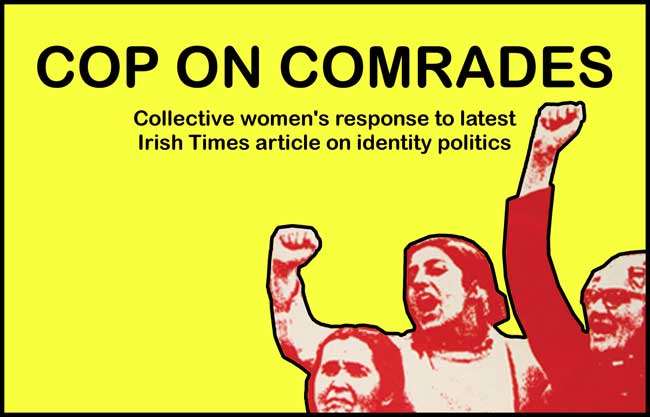 The following has been written by a collective of women activists in Ireland in part in response to an article that appeared in the Irish Times on Identity Politics and the way 'men on the left' engaged with that article. The version here is the original form as published meaning the signatures are those who were involved at some level in the drafting process. Additional names were added after publication, see link at the end. One of our members, Andrew, produced a timeline of key documents and discussion around this piece which explains the context in a lot more details.
The following has been written by a collective of women activists in Ireland in part in response to an article that appeared in the Irish Times on Identity Politics and the way 'men on the left' engaged with that article. The version here is the original form as published meaning the signatures are those who were involved at some level in the drafting process. Additional names were added after publication, see link at the end. One of our members, Andrew, produced a timeline of key documents and discussion around this piece which explains the context in a lot more details.
Good Protester, Bad Protester - Don't Fall for Divide & Conquer (Text & Audio)
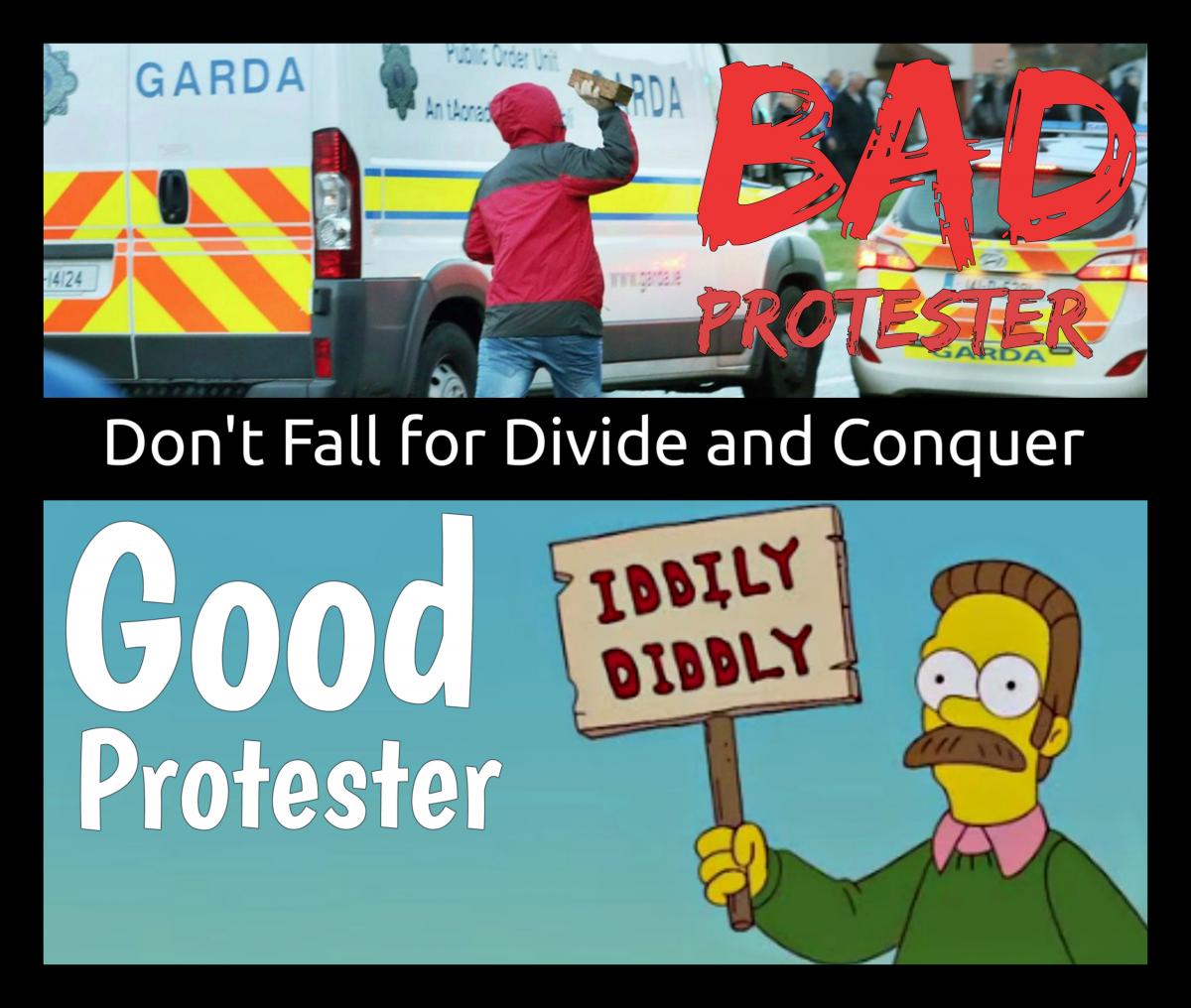 I'm not a bad protester, I promise. I'm a good protester. I'll be a good protester!
I'm not a bad protester, I promise. I'm a good protester. I'll be a good protester!
The farce that is the Jobstown [1] trial has mostly been a back and forth about what kind of protest is acceptable and right. Did the people of Jobstown keep Joan Burton and her assistant waiting for too long? Were they too foul mouthed? Too angry? Did they bang on the car too much? What about kids throwing water balloons? The infamous Jobstown brick? Maybe we should put them in prison then. At the heart of this argument is a very important notion: splitting people into 'Good Protesters' and 'Bad Protesters'. This article lays out exactly how that works, and how we should counter this divide and conquer tactic.
Rojava: a new world in our hearts?
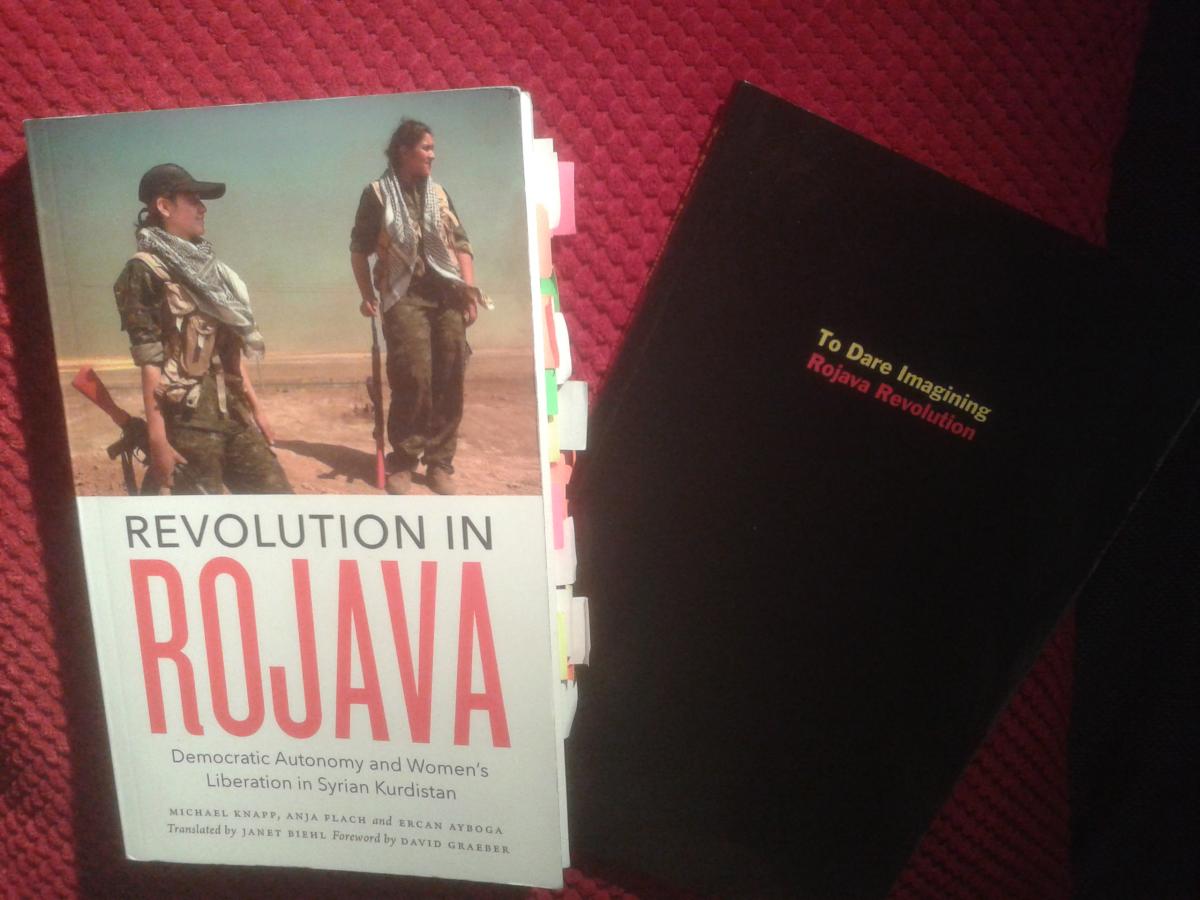
War is hell. In September 2015, the heartbreaking image of Alan Kurdi went viral. The picture of the little Syrian-Kurdish boy lying face down on Ali Hoca beach in Turkey highlighted Fortress Europe’s racist response to those refugees fleeing conflict in the Middle East. Abdullah Kurdi, Alan’s father, returned to Kobane to bury his wife and two sons. He wrote to the world: ‘I am grateful for your sympathy for my fate. This has given me the feeling that I am not alone. But an essential step in ending this tragedy and avoiding its recurrence is support for our self-organisation’. Kurdi was referring to the emergent experiment in popular democracy sweeping Rojava, the most hopeful thing to have happened in the Middle East for a very long time. A popular, anti-authoritarian rebellion is struggling against the death-world of capitalist modernity. And for now, it seems to be winning.
Derry's 1st Radical Bookfair a success
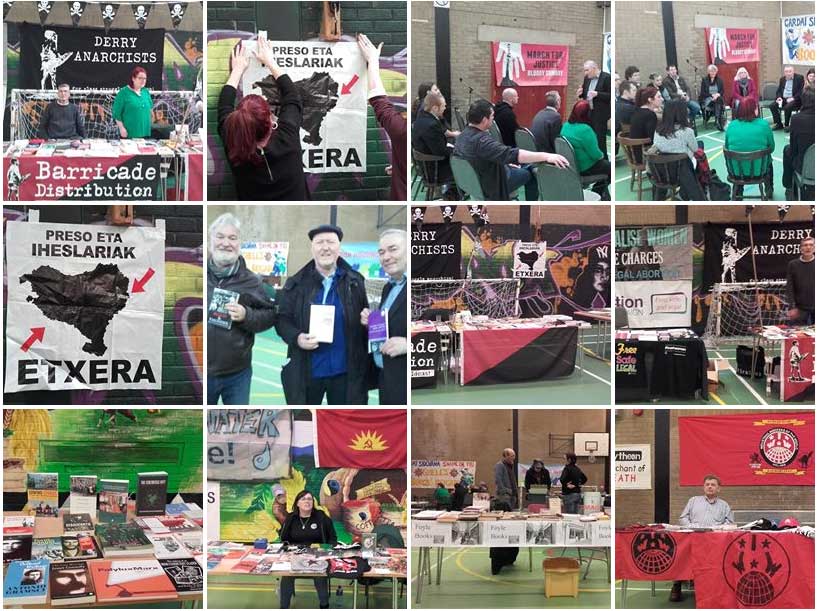 Derry's first ever Radical Bookfair was held over the Bloody Sunday week of events on Saturday 28th January 2017 in Pilots Row Community Centre. It's estimated that several hundred people passed through the doors of Rossville Street venue to explore what the days events had to offer as well as to rummage through the different book stalls to catch a bargin or two.
Derry's first ever Radical Bookfair was held over the Bloody Sunday week of events on Saturday 28th January 2017 in Pilots Row Community Centre. It's estimated that several hundred people passed through the doors of Rossville Street venue to explore what the days events had to offer as well as to rummage through the different book stalls to catch a bargin or two.
Revolution in Rojava - audio of Dublin launch and discussion by author
Revolution in Rojava” is an eye-witness account on the experience of creating a bottom up social order which actively challenges all forms of oppression and exploitation. The struggle in Rojava (a mostly Kurdish region north of Syria), despite the extent of counterrevolutionary and imperialist forces aligned against it, continues to nurture an autonomous, grassroots resistance across its multiply ethno-religious communities.

